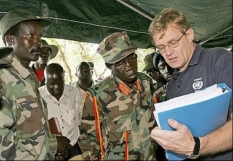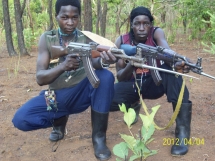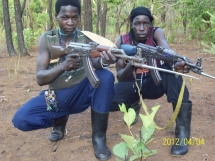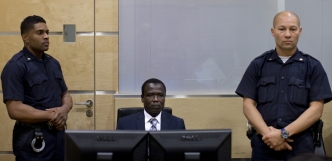A terrorist militia responsible for around 100,000 deaths before being hunted out of Northern Uganda is regaining strength in the Central African Republic (CAR), according to a senior Roman Catholic bishop there.
The Lord's Resistance Army, headed by Joseph Kony, imposed a reign of terror on the Acholi region of Northern Uganda in the 1980s and 90s. It specialised in the abduction of women into sexual slavery and the recruitment of child soldiers, often in the most brutal circumstances: a favoured tactic was to force children to kill their parents or siblings so they believed they would never be able to return home.
The LRA caused disruption to the region out of all proportion to its size, with terrified villagers becoming "night commuters", walking miles to places of safety rather than remain in their vulnerable homes.
The pressure saw the group hounded from its base in Northern Uganda into South Sudan, the Democratic Republic of Congo and then the CAR. It was thought to have been reduced to only around 200 fighters.
However, according to RNS, a Roman Catholic bishop, Rt Rev Nestor Desire Nongo-Aziagbia, has said the LRA has become one of the biggest threats to peace in the CAR.
"They continue to enslave villagers, making them load carriers and sex slaves," he said. "They are also burning down villages."
The CAR has seen an extended period of unrest, with tensions between the Christian and Muslim communities leading to conflict. Pope Francis visited the country last year against the advice of his security advisers and urged an end to hostilities. The LRA has taken full advantage of the unsettled state of the country. Nongo-Aziagbia said: "We are concerned there's no political will to defeat the rebels."
"This [resurgence] is of great concern to us," said Sheikh Musa Khalil, vice chair of the Acholi Religious Leaders Peace Initiative (ARLPI), a peace-building organisation in northern Uganda. "The group is still holding our children who it abducted. A resurgence complicates their return."
The LRA Crisis Tracker website documents a string of attacks on villages in the north of the CAR, involving the killing and abduction of adults and children.
Sheikh Khalil's concern reflects one of the most intractable issues around dealing with the LRA – that it is not just a military problem but a social and ethical one as well. During the last 20 years it has abducted many children who have grown up to become fighters and commanders in its ranks, and are themselves responsible for atrocities and massacres.
However, the Acholi community and its religious leaders have generally been opposed to the use of extreme military force to deal with them as they regard them as victims as well as perpetrators. The LRA itself began as a resistance movement against forces loyal to President Yoweri Museveni who conducted a terror campaign against the area after he came to power in 1986.
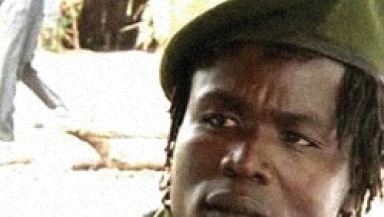
The LRA suffered a blow last year with the capture of one of its senior commanders, Dominic Ongwen, himself aformer child soldier taken from his family by the group. He was handed over to the International Criminal Court at The Hague over allegations of crimes including rape, murder, sexual enslavement and torture. It has not yet decided whether there is enough evidence to charge him.
However, while some of his victims and their families want him punished for what he has done, others urge forgiveness. Bishop Nelson Onono-Onweng, who has been active in seeking a peaceful end to the conflict with the LRA and undertook a dangerous meeting with its leader Joseph Kony and with Ongwen in the Congo in 2006, has said that Ongwen himself was a victim.
"The world betrayed this child. The state, which had the instruments to protect him, did not. The international community also took too long to act [against the] LRA. The world can see how things conspired against him."
Others have argued against bringing even high-profile terrorists like Ongwen to the ICC at all, saying that if they know they will face international justice it is harder to persuade them to lay down their arms. Retired Bishop Baker Ochola, a member of the ARLPI, said on Ongwen's arrest last year: "The government should not jeopardise the lives of children and women still in LRA captivity. We appeal to the government to forgive and set him free. He should be given amnesty as any rebel who surrenders, renounces and abandons rebellion."










